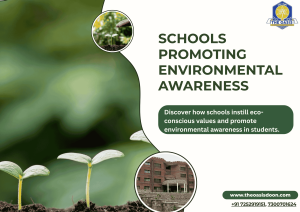
In today’s rapidly changing world, awareness of the environment has never been more vital. With the impacts of climate change, pollution, and forest loss increasingly becoming evident, it is critical for the next generation to understand their role in preserving the plants. Schools, particularly well-designed institutions such as boys boarding schools in Dehradun, possess a special platform for the development of responsible and environmentally aware citizens.
By integrating environmental values into the school curriculum, schools can foster a culture of sustainability that reaches far beyond the classroom.
- Why Environmental Awareness Matters in Education
- Strategies That Can Be Adopted by Schools to Foster Environmental Awareness
- Engaging Parents and the Larger Community
- Leveraging Technology and Media
- Building Lifelong Environmental Habits
- Final Thought
- Frequently Asked Question
- 1. Why is environmental awareness important for students?
- 2. How can schools practically implement environmental awareness programs?
- 3. What role do parents play in promoting environmental awareness?
- 4. How can technology help in teaching environmental awareness?
- 5. Can schools also promote environmental awareness effectively?
Why Environmental Awareness Matters in Education

A Foundation for the Future
When students learn about the importance of environmentalism early on, they adopt lifelong habits that promote sustainability. Educating on environmental issues isn’t only about nature; it’s about developing careful, educated citizens who know how their actions affect them and their world.
Preparing Responsible Citizens
Environmental education equips students with critical thinking skills. It encourages them to question practices that harm the planet and seek better alternatives. Such awareness builds leadership, responsibility, and compassion—traits that are good for individuals and communities.
Strategies That Can Be Adopted by Schools to Foster Environmental Awareness
1. Integrating Environmental Topics into the Curriculum
Environmental awareness should not be limited to science classes. Schools can weave environmental concepts into subjects like geography, literature, art, and even economics. For example:
- Geography: Learning about ecosystems, weather, and human influence on various areas.
- Literature: Reading and studying texts that touch on environmental issues.
- Art Projects: Creating art from recycled materials or illustrating scenes of nature preservation.
- Economics: Understanding the cost of pollution and the value of eco-friendly business practices.
2. Organizing Eco-Clubs and Green Committees
Schools can encourage students to form eco-clubs or green committees dedicated to promoting environmental awareness within the school community. These groups can:
- Lead recycling campaigns
- Conduct awareness drives
- Plant trees on campus
- Organize clean-up events
These activities provide students with first-hand experience in protecting the environment and show them that their efforts can have an impact.
3.Creating a Green School Culture
Schools can lead the way by embracing environmentally friendly practices, including:
- Using solar panels for electricity
- Installing rainwater harvesting systems
- Reducing plastic use in cafeterias
- Implementing strict recycling protocols
When students observe their school living the message it preaches, the environmental awareness message becomes more effective and credible.
4. Celebrating Environmental Days
Observing global events like Earth Day, World Environment Day, and Arbor Day encourages the whole school to unite for the cause of the environment. Some of the activities can be:
Poster competitions
- Essay writing
- Tree-planting ceremonies
- Guest lectures by environmentalists
These events give pride and participation to environmental awareness, which becomes a common objective.
Engaging Parents and the Larger Community

1.Parent Involvement
Parents play a critical role in reinforcing environmental awareness outside the classroom. Schools can:
- Host eco-workshops for parents
- Share green living tips in newsletters.
- Encourage parent participation in eco-events
This shared learning approach helps families adopt sustainable practices at home.
2. Partnering with Local Organizations
Schools can collaborate with NGOs, environmental groups, and local authorities to conduct workshops, nature excursions, and environmental audits. These partnerships bring in expertise and expand the reach of environmental awareness programs.
Leveraging Technology and Media
1. Utilizing Digital Platforms for Education
Environmental awareness can be made more interactive by the use of technology. Schools can utilize:
- Documentaries and nature films
- Interactive games and quizzes on sustainability
- Virtual tours of ecosystems
- Apps that track carbon footprints
The digital world enables students to learn about environmental problems outside textbooks and find innovative solutions.
2. Student-led environmental Campaigns on Social Media
Encouraging students to lead social media campaigns focused on the environment is a modern and impactful way to spread environmental awareness. Students can:
- Share sustainability tips
- Post videos of their green initiatives
- Promote eco-friendly lifestyle changes.
These campaigns can influence peers and even reach a wider audience outside the school.
Building Lifelong Environmental Habits

1. Encouraging Sustainable Daily Practices
Schools should promote everyday habits that reinforce environmental awareness, such as:
- Bringing reusable water bottles
- Avoiding single-use plastics
- Saving electricity by turning off unused appliances
- Composting food waste
When practiced consistently, these habits become second nature and instill a personal sense of responsibility.
2. Field Trips and Nature Walks
Exposure to nature can deepen students’ connection to the environment. Organizing trips to national parks, botanical gardens, or conservation areas helps students appreciate biodiversity and understand the importance of conservation first-hand.
Final Thought
Promoting environmental awareness in schools is not just an educational priority—it is a societal necessity. Whether through curriculum integration, eco-clubs, sustainable practices, or community engagement, schools can serve as powerful agents of change. For institutions like boys boarding schools in Dehradun and beyond, leading this charge means nurturing future leaders who respect and protect the planet.
As parents and educators, our joint efforts can inspire students to make informed, eco-friendly choices that ensure a healthier Earth for generations to come.
Frequently Asked Question
1. Why is environmental awareness important for students?
Environmental awareness helps students understand the importance of sustainability, develop eco-friendly habits, and become responsible citizens.
2. How can schools practically implement environmental awareness programs?
Schools can include environmental topics in the curriculum, form eco-clubs, practice sustainability on campus, and organize environmental events and campaigns.
3. What role do parents play in promoting environmental awareness?
Parents reinforce environmental values at home by practicing green habits, attending workshops, and supporting school initiatives.
4. How can technology help in teaching environmental awareness?
Technology offers interactive ways to learn about the environment through videos, apps, online games, and virtual tours that make learning more engaging.
5. Can schools also promote environmental awareness effectively?
Absolutely. Many schools, are well-equipped with resources, staff, and time to build comprehensive environmental programs.



